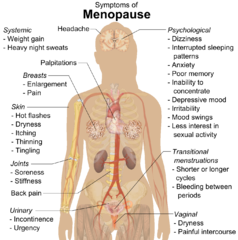Here is a brief look at a recent call I received from a 54-year-old woman in menopause with a long-term and unaddressed eating disorder. It's one of many I've received lately from menopausal women. Some are more positive about getting help, but all seem oblivious to the role menopause is playing in their emotional and eating disorder lives.
I'll call this particular woman Margaret. She has no family, little money, an unsatisfying job, and she is frightened that none of her dreams are coming true. She binges. She has no children. She's fighting to look good so she can have a boyfriend. Her Candida is plaguing her, and the Candida diet is triggering her eating disorder.
Margaret spoke to me from the depths of her active eating disorder without realizing how immersed she is in a life and mindset governed by eating disorder thinking. She didn't know that the hormonal changes she is experiencing as she moves through menopause are heightening her emotions, her cravings, and her need for eating disorder solutions to her problems. She didn't know that she was moving through a major developmental change that affected not only her body but also her sense of her own identity.
She wanted me to listen to her during a free consultation for as long as possible. The fifteen-minute consult extended to 40 minutes. Yes, I could have ended it, but I stayed on the line, wondering if she would eventually reach a point where she would ask for the help she desperately needed. She did not ask.
She told me about her past low-level jobs that kept her isolated and her new job that is stressful and demanding. She told me she used to have an eating disorder but doesn't anymore. She said she was binging out of control and that the Candida Diet was responsible. She said she was following the diet about 80% of the time.
I said that in order to work the Candida Diet has to be followed 100% of the time or you just inflame the starving fungus to devour what it needs and grow rapidly. Such a diet is often triggering to a person with an eating disorder. Margaret asked if I knew her health care person since I was saying exactly what he said.
She said she wanted to lose weight and was worried about her binging because she needed to be thinner in order to keep a man interested in her. She said she was sad because she now knows she will never have children and wondered why she never married or had a family when she wanted this so much.
She said she's seen several therapists over the years for about three or four weeks each, and they didn't help. She said she's read many books and been part of Landmark which used to be called EST. She said she wasn't a therapist, but she knew enough to be one.
Margaret asked if I knew anyone in her city she could talk to. She's committed to finding a short-term solution that will end her suffering and give her the life she wants.
Do you hear the eating disorder reverberating through her words? She wants a solution she can take in fast to solve her problems. That's what a binge is supposed to do.
The eating disorder has given her a template that says, gobble this up fast, and you'll get peace and safety. But what you actually get is numbness during the gobbling. That numbness sometimes feels like relief. When the binge is over, you are just where you were, but a little older, a little heavier and a little more frightened and despairing.
Opportunities to recover from an eating disorder exist at any age. The challenges of menopause combined with an eating disorder are severe yet may push you to take positive healing action for yourself.
Your challenge is to recognize opportunity. The reality is that you have to move beyond or away from the eating disorder template to develop in a new way, independent of your old and ineffective solution attempts. You can't recover from an eating disorder by obeying eating disorder patterns.
What are your recovery opportunities? Make a list. Then, see how many points follow your eating disorder's way of thinking and how many come from a glimpse into new possibilities.
Tips: Disregard items on your list that come from eating disorder thinking, such as:
- Anything that looks like a fast, short-term answer with a big payoff.
- Anything that has to be done in secret.
- Anything that won't cause a change in how you use your finances.
- Anything that won't disrupt your life as you know it now.
- Anything that has to be comfortable and easy.
Menopause is a time for readjustments and new self-evaluation. It's a time of endings and beginnings. Let it also be a time of commitment to recovery.
Suggested Readings:
Eating Disorders and Women Over 50
Eating disorders: Not just for the young
Eating disorders in midlife women: A perimenopausal eating disorder?
Please share your thoughts in the comment section below.
Written by Joanna Poppink, MFT. Joanna is a psychotherapist in private practice specializing in eating disorder recovery, stress, PTSD, and adult development.
She is licensed in CA, AZ, OR and FL. Author of the Book: Healing Your Hungry Heart: Recovering from Your Eating Disorder
Appointments are virtual.
For a free telephone consultation, e-mail her at



Add comment